| Total population | |
|---|---|
| 1,491 (Danish born) 3,507 (Danish ancestry) [1] | |
| Languages | |
| Religion | |
| Related ethnic groups | |
| Danes, Scandinavian New Zealanders, Norwegian New Zealanders, Swedish New Zealanders |
Danish New Zealanders are New Zealanders with full or partial Danish ancestry. The majority of these people are part of the Danish diaspora.
There is a small Danish community in New Zealand, descended from a group of early settlers who came to clear thick North Island bush in the middle years of the 19th century and stayed to found settlements including Dannevirke and Norsewood. [2] [3] High-ranking Danish churchman, Bishop Ditlev Gothard Monrad, who had been Danish Prime Minister during the Second Schleswig War, left Denmark as a result of the war and settled with his family in Karere near Palmerston North in 1866, where he set up the first dairy plant in the region. [4] [5] [6] Monrad returned to Denmark in 1869, but other members of his family stayed in New Zealand. [7] He left behind his collection of art now housed at the Museum of New Zealand Te Papa Tongarewa. [8] Those who stayed cleared the bush in the area, and their efforts helped convince Julius Vogel that they were suitable in character to become part of his planned 'Great Public Works' scheme of the 1870s. [9] Isaac Featherston went to Scandinavia in 1870 to attract settlers in Norway, Sweden and Denmark. [10] The first settlers from this initiative arrived in 1871 and settled in the bush between Palmerston North and Foxton. [11] Other Danes came to the Seventy Mile Bush area in 1872 and founded the town which retains the Danish name of Dannevirke, commemorating the Danevirke in Slesvig. [4] [12] The other town created by the Danes was Norsewood. [4] Both those towns were named by the government. [11]
New Zealand has encouraged immigration of temporary workers from Denmark. [13]
When the Danes immigrated to New Zealand, they brought with them their language, festivals, food and culture and assimilated to New Zealand society, such as by learning English. There is the Danish Society Inc. in Auckland which promotes Danish history, culture and language within New Zealand. [14] There is also the Danish Societies in the upper North Island, which includes the Danish Society, Hamilton and the Danish Society, Auckland which hosts festivals and run a newsletter. [15]
| Oscar Alpers | 1866-1927 | Teacher, English lecturer, historian, Supreme Court Judge | Danish born |
|---|---|---|---|
| Colin Beyer | 1938–2015 | Lawyer, businessman | Of Danish descent |
| Arnold Christensen | 1922–1944 | Royal New Zealand Air Force pilot during World War II | Of Danish descent |
| Joy Cowley | 1936– | Author | Of Danish descent |
| Marton Csokas | 1966– | Actor | Of Danish descent |
| Yvonne du Fresne | 1929–2011 | Author | Of Danish descent |
| Fairfax Fenwick | 1852–1920 | Cricketer | Danish-born |
| Herbert Fenwick | 1861–1934 | Cricketer | Danish-born |
| Kristian Fredrikson | 1940–2005 | Stage and costume designer | Of Danish descent |
| Ditlev Gothard Monrad | 1811–1887 | Politician, Council President of Denmark | Danish-born |
| Craig Parker | 1970– | Actor, acted in The Lord of the Rings trilogy | Of Danish descent |
| Bill Schramm | 1886–1962 | Politician, lawyer | Of Danish descent |
| Linda Villumsen | 1985– | Olympic cyclist | Danish-born |

Dannevirke, is a rural service town in the Manawatū-Whanganui region of the North Island, New Zealand. It is the main centre of the Tararua District.

Pahiatua is a rural service town in the south-eastern North Island of New Zealand with a population of 2,840. It is between Masterton and Woodville on State Highway 2 and along the Wairarapa Line railway, 60 kilometres (37 mi) north of Masterton and 30 kilometres (19 mi) east of Palmerston North. It is usually regarded as being in the Northern Wairarapa. For local government purposes, since 1989 it has been in the Tararua District, which encompasses Eketāhuna, Pahiatua, Woodvillle, Dannevirke, Norsewood and the far east of the Manawatū-Whanganui region.
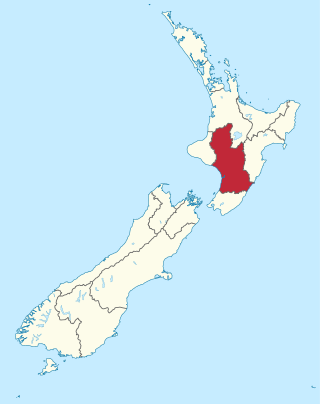
Manawatū-Whanganui is a region in the lower half of the North Island of New Zealand, whose main population centres are the cities of Palmerston North and Whanganui. It is administered by the Manawatū-Whanganui Regional Council, which operates under the name Horizons Regional Council.
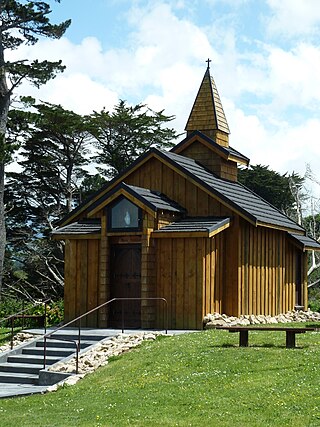
Norsewood is a small rural settlement in the Tararua District and Manawatū-Whanganui region of New Zealand's North Island. The town is situated east of the Ruahine Mountain range and is located 20 kilometres northeast of Dannevirke.
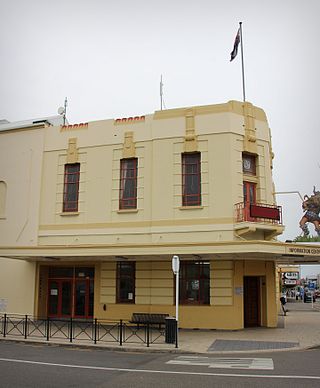
The Tararua District is a district near the south-east corner of New Zealand's North Island that is administered by the Tararua District Council. It has a population of 19,200, and an area of 4,364.65 km². The Tararua District Council was created by the amalgamation of the Dannevirke Borough, Eketahuna County Council, Pahiatua Borough Council, Pahiatua County Council and Woodville District Council in the 1989 local government reforms.
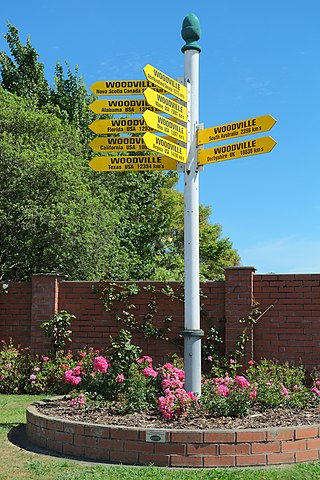
Woodville, previously known as The Junction, is a small town in the southern North Island of New Zealand, 75 km north of Masterton and 25 km east of Palmerston North. The 2013 census showed that 1401 people reside in Woodville.
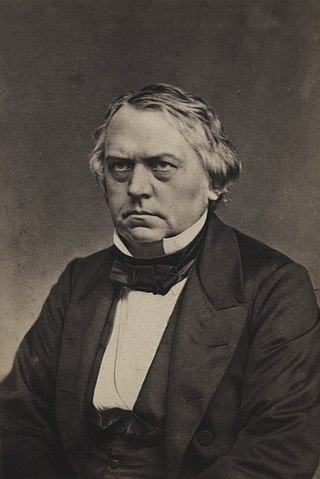
Ditlev Gothard Monrad was a Danish politician and bishop, and a founding father of Danish constitutional democracy; he also led the country as Council President in its huge defeat during the Second Schleswig War. Later, he became a New Zealand pioneer before returning to Denmark to become a bishop and politician once more.
Longburn is a rural settlement just outside Palmerston North in the Manawatū-Whanganui area of New Zealand. Made up of large dairy processing plants Longburn is often mistaken to be a small township and not seen as a large satellite town of Palmerston North. The township is home to both Longburn School and Longburn Adventist College.
Te Rehunga is a rural locality located in the Tararua District, part of the Manawatu Whanganui Region of New Zealand.

Denmark–New Zealand relations are the foreign relations between Denmark and New Zealand. As of 2021, neither country has a resident ambassador. Denmark is represented in New Zealand through its embassy in Canberra (Australia), a trade commission in Auckland, and honorary consulates in Auckland, Wellington, and Christchurch. New Zealand is represented in Denmark through its embassy in Stockholm, Sweden and an honorary consulate in Copenhagen. The New Zealand government describes relations as "good" and records a high degree of agreement on international affairs.

Norway-New Zealand relations are foreign relations between Norway and New Zealand. The two countries established diplomatic relations in 1905, after Norway gained independence. New Zealand's embassy in the Hague, Netherlands represents New Zealand diplomatically in Norway. Norway is represented in New Zealand by the Norwegian Embassy in Canberra, Australia. Around 1,400 Norwegians live in New Zealand and 929 New Zealanders live in Norway.

The Seventy Mile Bush was a heavily forested area of New Zealand extending from Wairarapa to Central Hawkes Bay and out to that coast. It was cleared and settled by Scandinavians, assisted immigrants in the 1870s. On arrival they walked from the surrounding coastal settlements to cut down the forest and clear the land for farming. The land was not as described to them. Without funds for a return passage they were obliged to remain.
Norwegian New Zealanders are New Zealanders of Norwegian ancestry, the majority of whom are part of the Norwegian diaspora.
George Conrad Petersen was a New Zealand lawyer, consul, local politician and historian.

Mauriceville is a rural locality in the Masterton district, part of the Wairarapa region of New Zealand's North Island. The area is about half-way between Masterton and Eketāhuna, and is today split between Mauriceville East and Mauriceville West.

Martin Johannes Hammerich was a Danish art historian, educator, author, and translator. He was part of the National Liberal movement and a member of the 1848 Danish Constituent Assembly. He was headmaster of Borgerdydskolerne from 1842 to 1867.
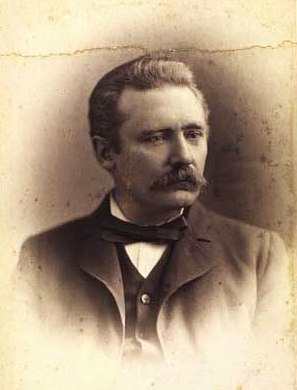
Niels Christian Frederiksen (Friderichsen) (23 March 1840 - 4 November 1905) was a Danish national economist, businessman and politician. He was a professor at the University of Copenhagen from 1867 and was a member of Folketinget from 1865. He emigrated to America after the collapse of his business conglomerate but returned to Denmark after a second bankruptcy. He was the brother of Erhard Frederiksen and Kirstine Frederiksen.
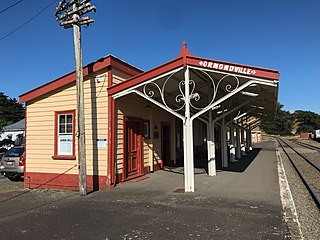
Ormondville is a locality in the Manawatū-Whanganui region of New Zealand's North Island. It is located inland, south of Waipukurau and west of Flemington, Hawke's Bay.

Matamau is a small village, on a ridge between the Matamau and Whakaruatapu Streams, tributaries of the Manawatū River, in the Manawatū-Whanganui region of New Zealand's North Island. State Highway 2 and the Palmerston North–Gisborne line run through the village. It has a rare surviving example of a basic railway station, a cafe, developed from the former post office and store about 1969, and a truck repair workshop. Until the 1870s it was densely forested, but most of the trees were felled and milled by 1910 and replaced by farms.
N.Z., is worth quoting, as it reveals some of the sentiments within the Danish community at the end of the last century: "Vågn op I danske Drenge Til Munterhed og Sang, Vi nu New Zealand tjene, Og blive nok ... Not all Scandinavian settlers were as successful as the last line hoped they would be, and present day Dannevirke and Norsewood show little of the once thriving Scandinavian communities there.
In 1866 New Zealand received an unusual and notable immigrant in the person of one who had recently been premier of Denmark, was a bishop of the Lutheran Church, ... Ditlev Gothard Monrad was in all respects a remarkable figure.
Ditlev Gothard Monrad, the deposed prime minister of Denmark and Bishop of Lolland and Falster, arrived in the Manawatu after ... Although Monrad returned to Danish parliamentary life in 1869, his two sons remained behind.
Dannevirke [...] in the Upper Manawatu basin [...] This town was originally a Danish settlement in the Seventy-mile B[u]sh [...]